Abstract
The effects have been studied of water stress and desiccation on protein synthesis in the drought-tolerant moss Tortula ruralis and the drought-sensitive moss Hygrohypnum luridum. At any particular level of steady state water stress, the inhibition of protein synthesis was greater in H. luridum than in T. ruralis. Water stress-induced changes in the pattern of protein synthesis, as determined by the double label ratio technique, were minor in T. ruralis, but major in H. luridum. Proteins of both mosses were found to be stable during desiccation and subsequent rehydration. Changes in membrane permeability, as indicated by the leakage of amino acid, were observed during rehydration of desiccated moss and were dependent on the rate of desiccation. The leakage was small and reversible in T. ruralis but large and irreversible in H. luridum. Although H. luridum failed to recover from complete desiccation (80% loss in fresh weight), it was able to recover fully from steady state stress under conditions where a maximum loss of 55% in fresh weight was recorded.
Full text
PDF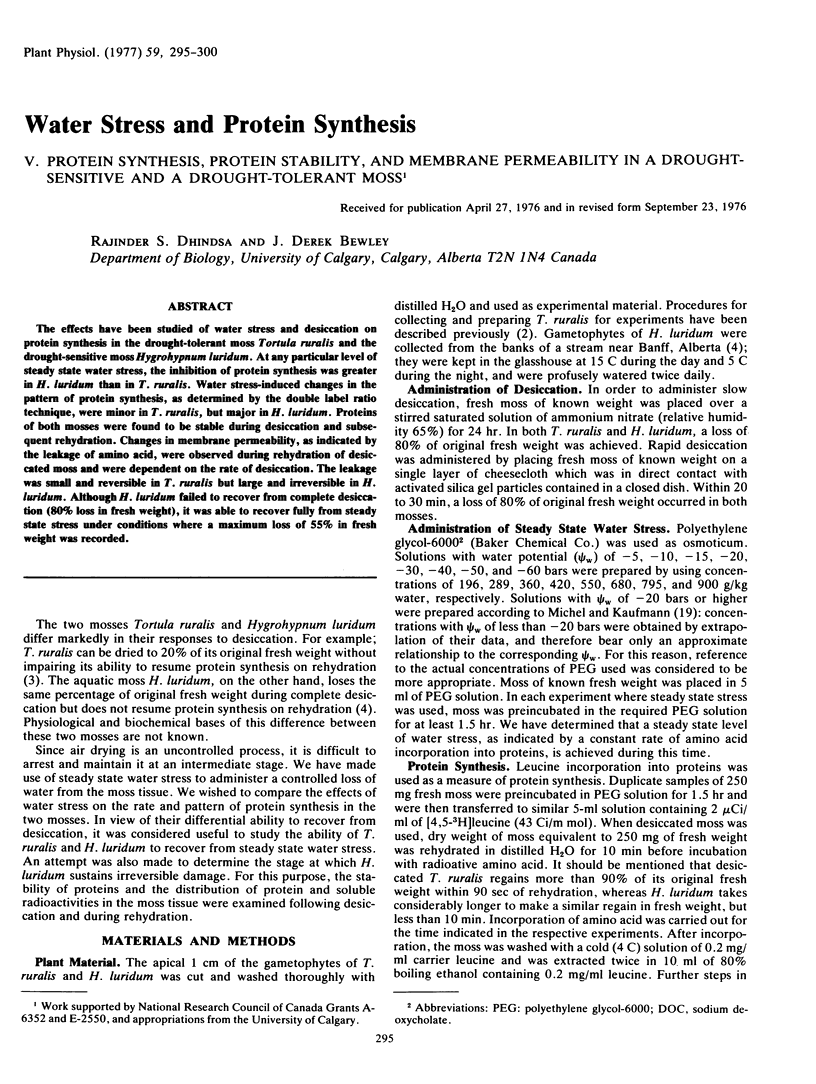
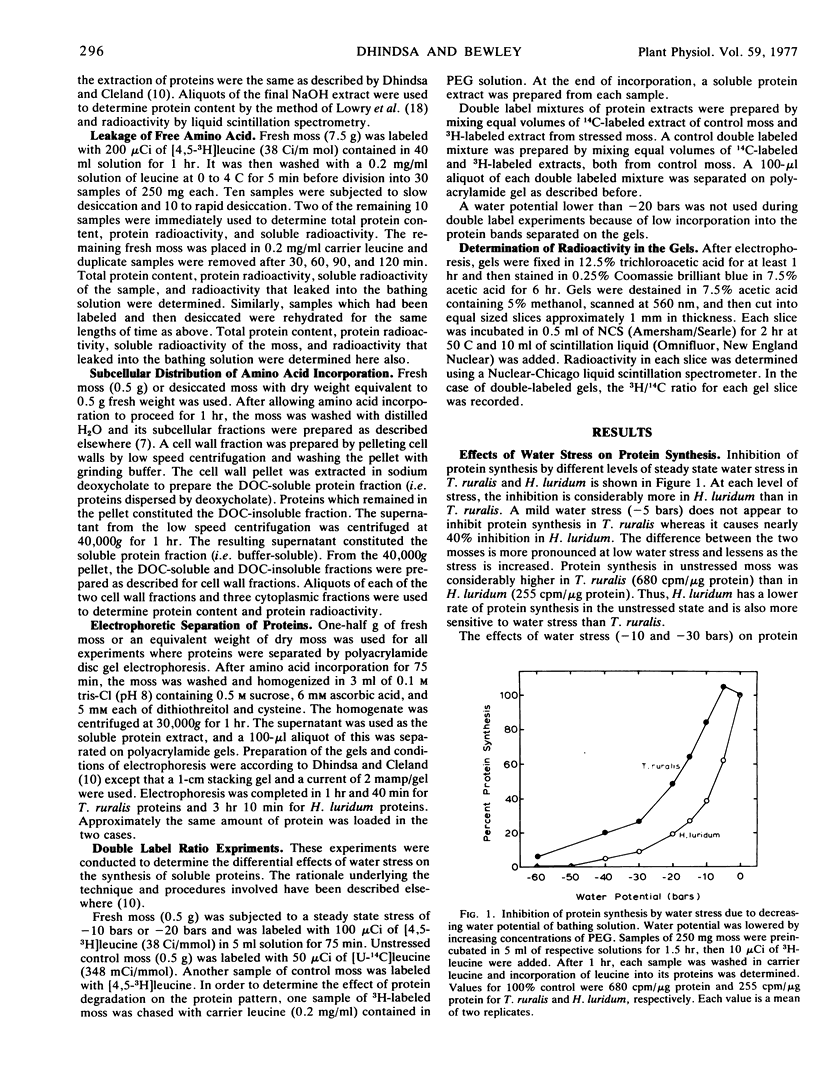
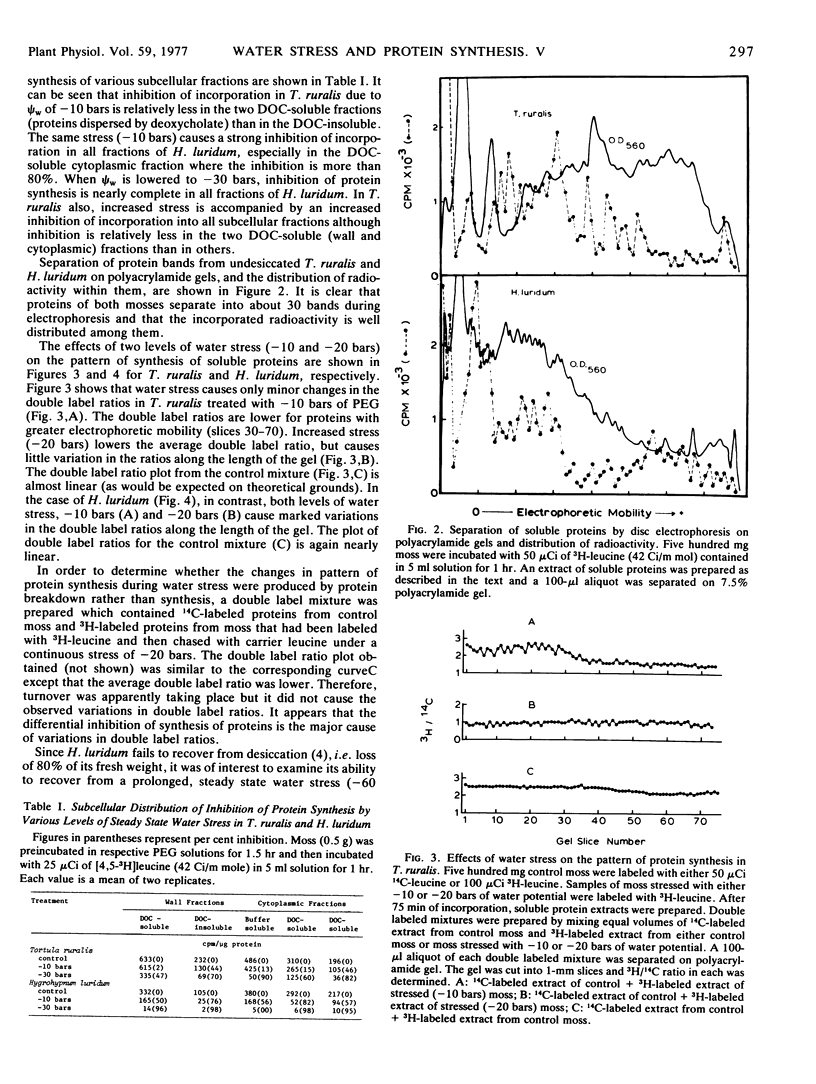
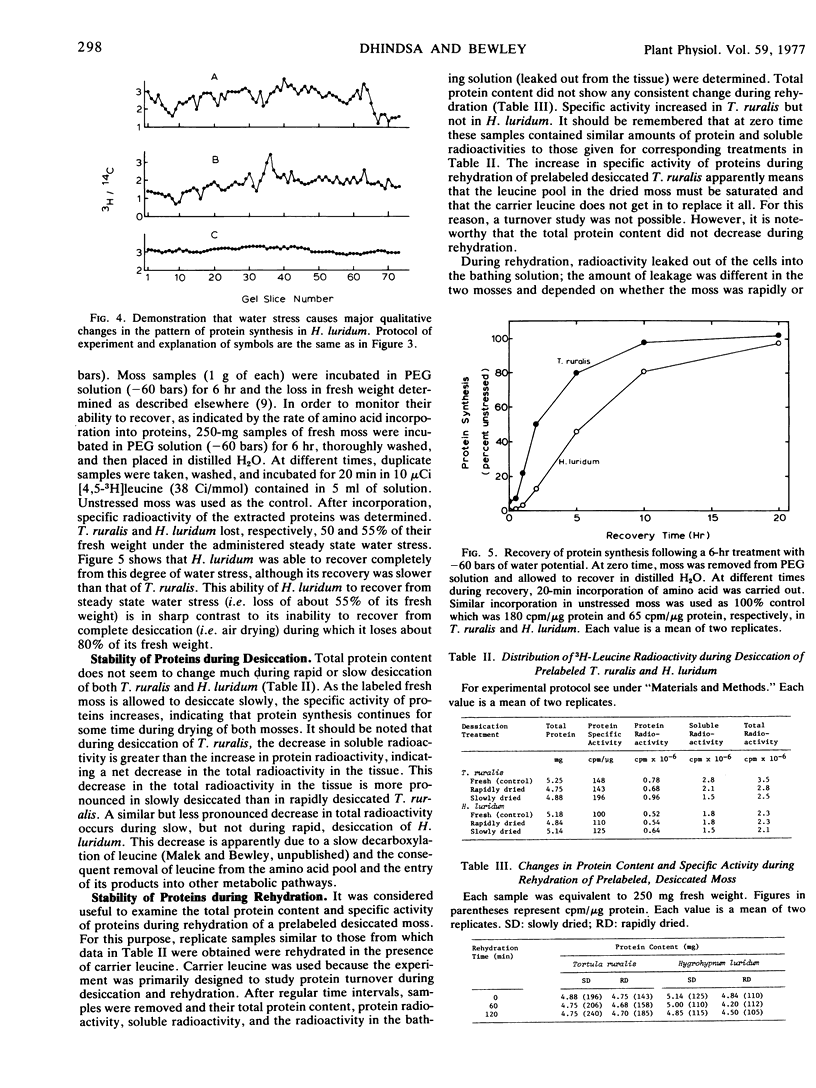
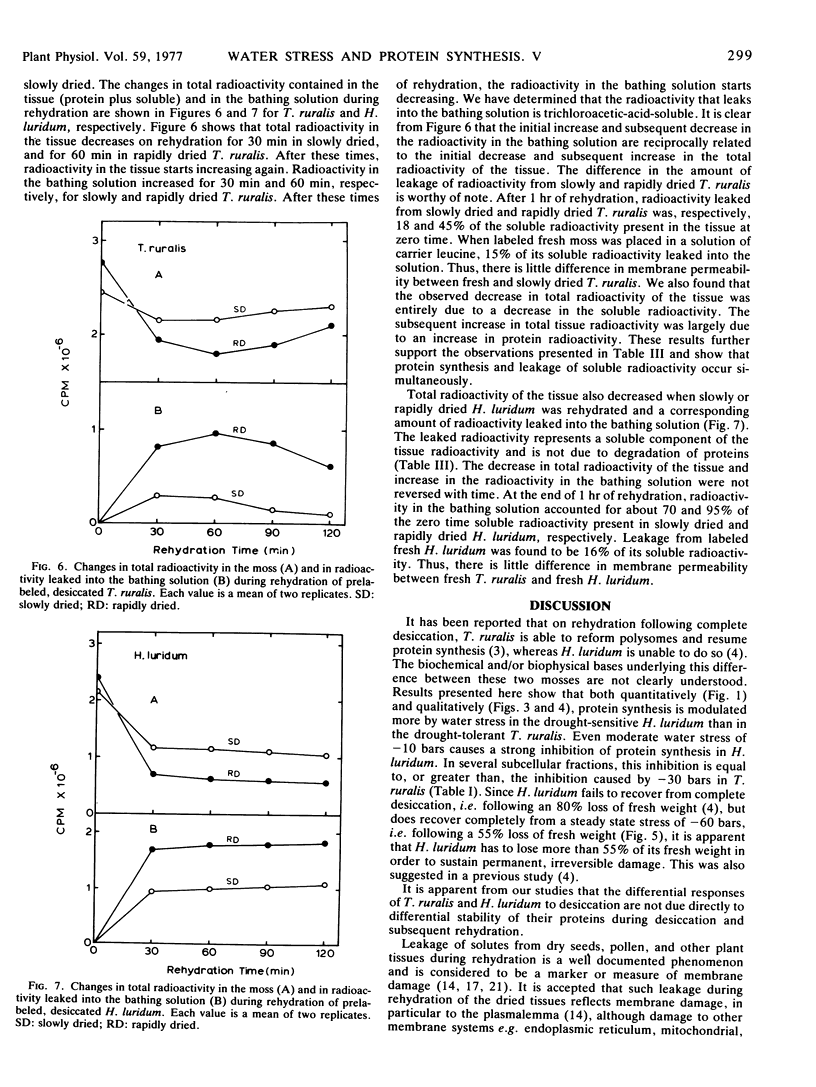
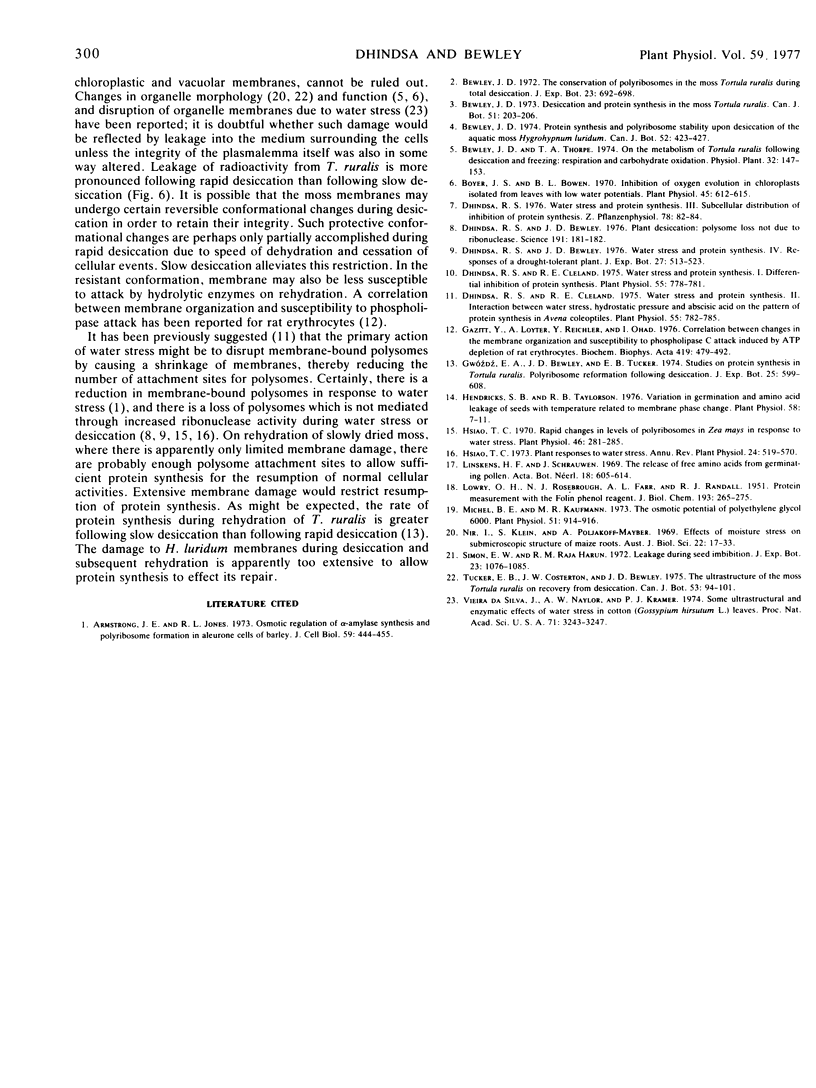
Selected References
These references are in PubMed. This may not be the complete list of references from this article.
- Armstrong J. E., Jones R. L. Osmotic regulation of alpha-amylase synthesis and polyribosome formation in aleurone cells of barley. J Cell Biol. 1973 Nov;59(2 Pt 1):444–455. doi: 10.1083/jcb.59.2.444. [DOI] [PMC free article] [PubMed] [Google Scholar]
- Boyer J. S., Bowen B. L. Inhibition of oxygen evolution in chloroplasts isolated from leaves with low water potentials. Plant Physiol. 1970 May;45(5):612–615. doi: 10.1104/pp.45.5.612. [DOI] [PMC free article] [PubMed] [Google Scholar]
- Da Silva J. V., Naylor A. W., Kramer P. J. Some ultrastructural and enzymatic effects of water stress in cotton (gossypium hirsutum L.) leaves. Proc Natl Acad Sci U S A. 1974 Aug;71(8):3243–3247. doi: 10.1073/pnas.71.8.3243. [DOI] [PMC free article] [PubMed] [Google Scholar]
- Dhindsa R. S., Bewley J. D. Plant desiccation: polysome loss not due to ribonuclease. Science. 1976 Jan 16;191(4223):181–182. doi: 10.1126/science.1246604. [DOI] [PubMed] [Google Scholar]
- Dhindsa R. S., Cleland R. E. Water Stress and Protein Synthesis: II. Interaction between Water Stress, Hydrostatic Pressure, and Abscisic Acid on the Pattern of Protein Synthesis in Avena Coleoptiles. Plant Physiol. 1975 Apr;55(4):782–785. doi: 10.1104/pp.55.4.782. [DOI] [PMC free article] [PubMed] [Google Scholar]
- Dhindsa R. S., Cleland R. E. Water stress and protein synthesis: I. Differential inhibition of protein synthesis. Plant Physiol. 1975 Apr;55(4):778–781. doi: 10.1104/pp.55.4.778. [DOI] [PMC free article] [PubMed] [Google Scholar]
- Gazitt Y., Loyter A., Reichler Y., Ohad I. Correlation between changes in the membrane organization and susceptibility to phospholipase C attack induced by ATP depletion of rat erythrocytes. Biochim Biophys Acta. 1976 Feb 6;419(3):479–492. doi: 10.1016/0005-2736(76)90260-1. [DOI] [PubMed] [Google Scholar]
- Hendricks S. B., Taylorson R. B. Variation in germination and amino Acid leakage of seeds with temperature related to membrane phase change. Plant Physiol. 1976 Jul;58(1):7–11. doi: 10.1104/pp.58.1.7. [DOI] [PMC free article] [PubMed] [Google Scholar]
- Hsiao T. C. Rapid Changes in Levels of Polyribosomes in Zea mays in Response to Water Stress. Plant Physiol. 1970 Aug;46(2):281–285. doi: 10.1104/pp.46.2.281. [DOI] [PMC free article] [PubMed] [Google Scholar]
- LOWRY O. H., ROSEBROUGH N. J., FARR A. L., RANDALL R. J. Protein measurement with the Folin phenol reagent. J Biol Chem. 1951 Nov;193(1):265–275. [PubMed] [Google Scholar]
- Michel B. E., Kaufmann M. R. The osmotic potential of polyethylene glycol 6000. Plant Physiol. 1973 May;51(5):914–916. doi: 10.1104/pp.51.5.914. [DOI] [PMC free article] [PubMed] [Google Scholar]


